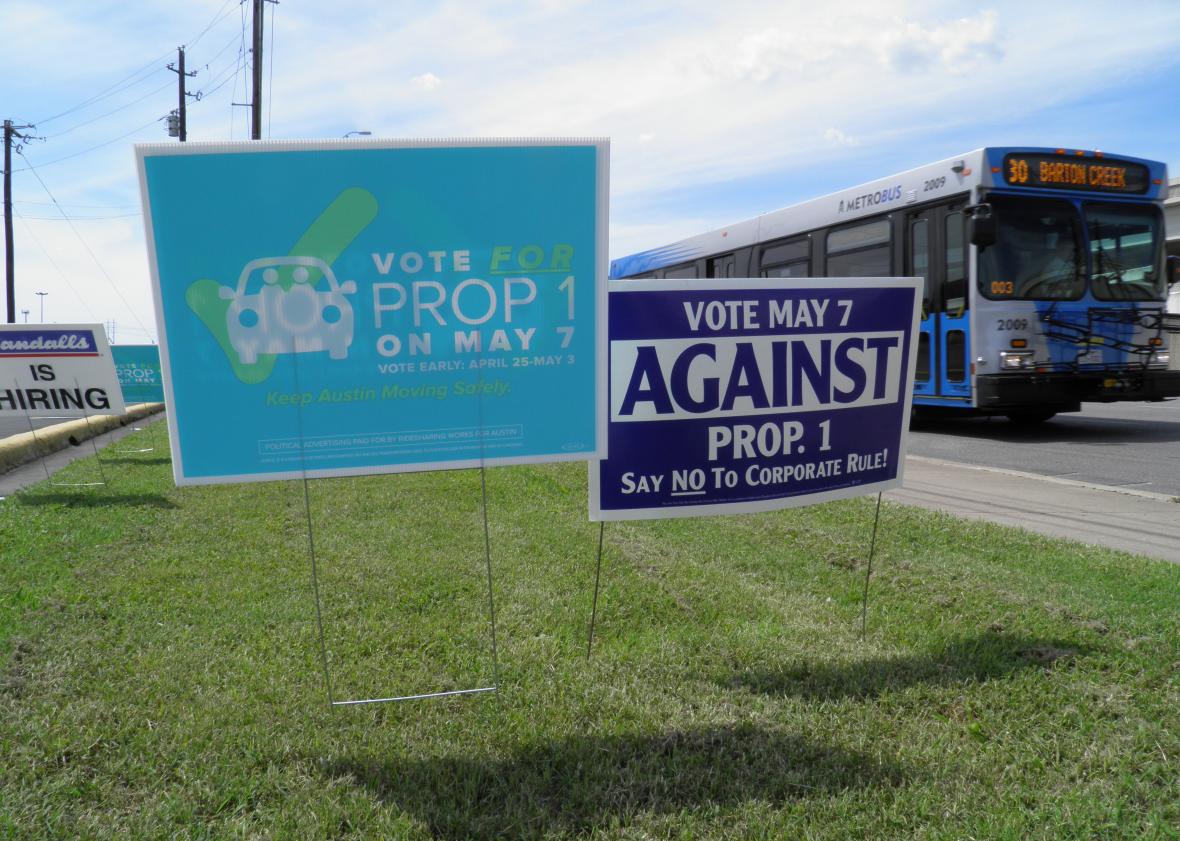In some ways, it’s the same old story: Uber and Lyft have pulled their services from Austin, Texas, over a law that will require drivers to submit fingerprints as part of a background check.
Over the past two years, the two ride-hailing companies have made a dozen similar threats between them and in several cases followed through, dramatically dropping their service in response to regulation they say threatens their business model. But Austin is a little different. For one thing, each company claims to “employ” more than 10,000 drivers there. While neither company publicizes driver counts, the Texas capital is almost certainly the biggest market in which Uber and Lyft have shut down.
More importantly, Austin is the first big city where Uber and Lyft have lost in a referendum. It wasn’t pretty: Despite obliterating the record for political spending in Austin—exceeding the mayor’s 2014 campaign by a factor of seven—the companies lost the vote by 12 percentage points. They spent $224 for each of the 38,539 votes cast in their favor.
Typically, Uber has responded to setbacks by rallying popular support against politicians in public while helping those beleaguered pols write more friendly laws in private.
So what happens in Austin, where the responsible party isn’t a politician aligned with the taxi industry but the voting public? How does either company argue for overturning a plebiscite that upheld a simple safety law?
Here’s how it usually works: Last May, Uber withdrew all service from Kansas after the state Legislature passed comprehensive safety regulation. Less than three weeks later, the Legislature revised the bill to drop a requirement, among other changes, that drivers be checked out by the Kansas Bureau of Investigation. Gov. Sam Brownback left the capital on a celebratory Uber ride.
The company’s departure from San Antonio last year, after unhappy negotiations with regulators, followed a similar script. Uber left the streets but never left city hall. Six months later, “in the spirit of collaboration we’ve come to expect from the company,” Alison Griswold wrote in Slate, “Uber got just about everything it wanted.”
Battling with politicians makes for good disruption theater, and Uber has played the role particularly well. In New York, the company humiliated Mayor Bill de Blasio when he attempted to cap ride-hailing services’ growth, citing traffic concerns. Uber added a slower “de Blasio” mode to its app, enlisted the support of celebrities like Kate Upton, and sent ex-Obama strategist (and current Uber adviser) David Plouffe to do a photo op at a famous Harlem restaurant.
The optics in Austin are more complex. Ignoring the referendum, the company greeted riders on Monday with this message: “Due to regulations passed by City Council, Uber is no longer available within Austin City Limits. We hope to resume operations under modern ridersharing regulations in the near future.” You don’t need to be a patriot for ballot referendums to see how the Austin vote challenges Uber’s strategy.
How could something so simple as fingerprinting—which New York and Houston also require of transportation network companies (or TNCs) like Uber—derail a business model that seems to thrive everywhere it goes? The distinction between the background checks favored by cities and those favored by TNCs has been a sticking point again and again. Lyft, which has come to be seen as Uber’s more cooperative little brother, left Houston in 2015 over the issue. Uber is threatening to do the same and stopped service in Corpus Christi and Galveston earlier this year.
But there’s another page of the TNC playbook that deals with recalcitrant cities. Mississippi cities like Oxford, Gulfport, Biloxi, and Jackson that attempted to regulate Uber will lose the ability to impose taxes or require licenses for TNCs on July 1, after the passage of a state-level bill last month. A handful of other states have also taken that power away from cities with legislation Uber has supported.
In Texas, the day after the Austin vote, state Sen. Charles Schwertner announced plans to usurp TNC regulation powers from the state’s cities. You see ballot referendum; Texas state Rep. Matt Rinaldi sees local tyranny.
